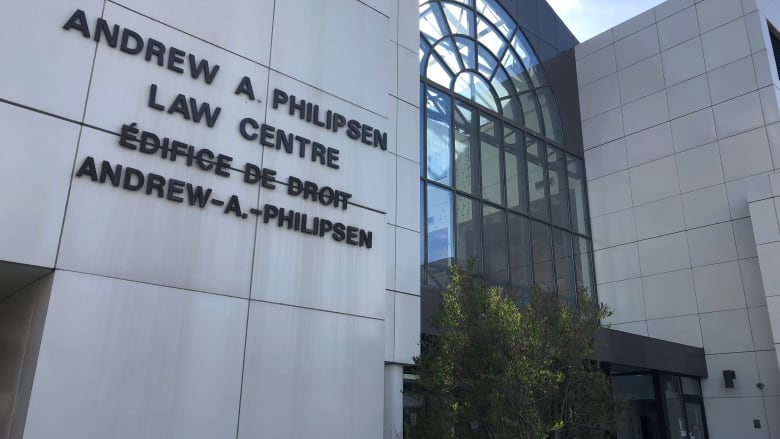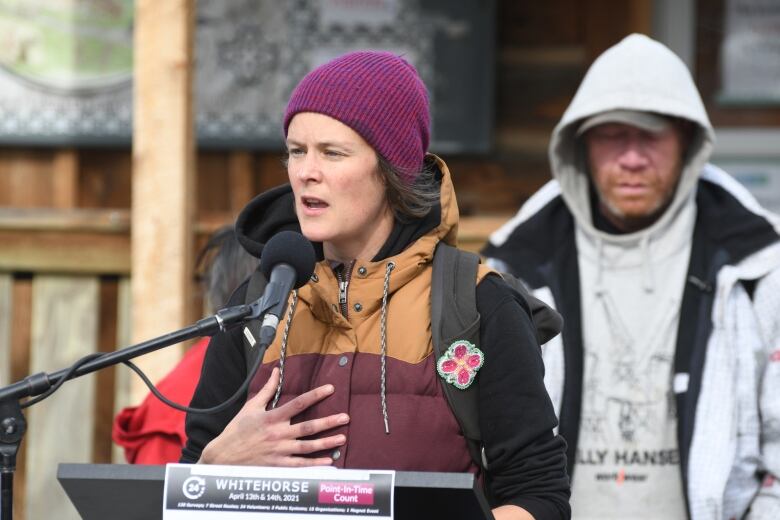'Safer communities' law hurts vulnerable people, say Yukon advocacy groups joining legal battle
Legislation disproportionately impacts vulnerable, marginalized people, groups say in affidavits filed Aug. 31

Four Yukon advocacy organizations have thrown their weight behind a legal challenge of the territory's Safer Communities and Neighbourhoods (SCAN) legislation, charging that it disproportionately impacts and harms already-vulnerable people by rendering them homeless.
Representatives for Blood Ties Four Directions, the Safe at Home Society, the Yukon Status of Women Council and the Yukon Anti-Poverty Coalition filed affidavits to the Yukon Supreme Court on Aug. 31, all calling for the act to be reviewed.
The affidavits are part of a constitutional challenge launched by Whitehorse woman Celia Wright against a section of the act that allows the Yukon government's SCAN unit to carry out evictions in response to complaints about illegal activity such as drug trafficking or bootlegging.
Wright, a mother of eight, filed her challenge after receiving a five-day eviction notice in December 2020 following an anonymous complaint.
Complaints about illegal activity under SCAN do not need to make their way through the criminal justice system before the SCAN unit can take action.
Eviction doesn't support safety, Blood Ties says
Blood Ties' executive director Bront Renwick-Shields said in an interview Sept. 2 that her organization, which offers harm-reduction resources for people who use substances, has "recognized frequent occurrences where SCAN has placed someone in a position where they're experiencing homelessness."
"We recognize that community safety is important [but] we don't believe placing people in homelessness is effectively supporting that goal," she said.
"By putting people into homelessness in a housing crisis, we are also decreasing their safety, their mental health and potentially community safety if now that individual doesn't have a safe place to go."
While she didn't have an exact number, Renwick-Shields said, in her four years with Blood Ties, she's seen "many individuals" impacted by SCAN evictions, including people who weren't necessarily the subjects of complaint, but shared a house with people who were.
SCAN evictions are not person-specific, but applied to properties at the centre ofcomplaints as a whole.
Clients don't know they can challenge evictions
In her own affidavit, Yukon Anti-Poverty Coalition (YAPC) co-chair Charlotte Hrenchuk wrote that, in her experience, one SCAN eviction can lead to "further evictions, or a cascade of evictions" as people try to find other places to stay, including with friends and family.
She also wrote that clients impacted by SCAN evictions often didn't know they "could try to challenge the eviction, much less go about challenging it," and if they did know, didn't have the resources to do so.
"YAPC is concerned that the legislation has an inequitable impact on people who are already impoverished and living precariously in situations they would not choose if they had genuine, accessible options," she wrote. "Although not the intention of the legislation, it is definitely a negative consequence of the legislation and one that we have seen many times."
Yukon Status of Women Council's executive director, Aja Mason, meanwhile, wrote that SCAN "exemplifies how sex workers are criminalized and stigmatized," noting that the SCAN unit can act on complaints about "prostitution" or "activities related to prostitution" despite the selling of sex not being illegal in Canada.
"This is an egregious misrepresentation of the Canadian Criminal Code and vague language," she wrote.
Mason added that the lack of gender-specific, low-barrier shelters in the Yukon meant that women evicted through SCAN and who actively use substances are not able to access women's shelters, "thereby relegating them to spaces that are significantly less safe."

Review of SCAN 'would be in the best interest'
Safe at Home executive director Kate Mechan wrote in her affidavit that her organization "has observed the displacement of individuals and families through SCAN from one neighborhood to another, truncating support networks and systems of care for the individuals displaced."
"Given the frequency with which this law creates unfortunate housing instability for vulnerable individuals[,] the constitutionality of SCAN should be examined by a Court," Mechan wrote.
She added that "mitigating negative social impacts should be considered when legislating community well being," and that a "thorough review" of SCAN "would be in the best interest" of the community.
Wright's petition has not been heard in court yet.
The Canadian Civil Liberties Association filed an application to be added as an intervenor to the case in August. The Yukon Supreme Court will hear the application later this month.












_(720p).jpg)


 OFFICIAL HD MUSIC VIDEO.jpg)
.jpg)



























































































